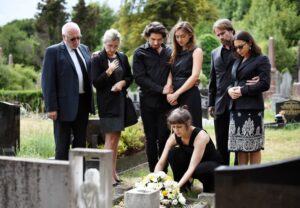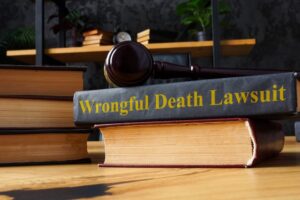Filing a Wrongful Death Claim After a Car Accident
Filing a Wrongful Death Claim After a Car Accident
If you lost a loved one in a car accident due to someone else’s negligence or wrongdoing, you may seek justice and compensation by filing a wrongful death claim. Although this process can be overwhelming, understanding the steps involved can help you navigate through the legal system and get the compensation you need.
Whether the car accident was caused by a reckless driver, a defective vehicle component, or poor road conditions, holding the responsible party accountable can bring a sense of closure and financial support for the surviving family members.
By taking legal action, you not only seek justice but also create awareness about the dangers of reckless driving and contribute to making our roads safer for everyone. It’s important to understand what a wrongful death claim is and how to qualify for compensation as well as where to seek legal assistance during the process.
Your best course of action is to contact a car accident attorney near you who handles wrongful death actions. A wrongful death lawyer will have the knowledge and experience necessary to protect your rights and help you obtain the justice and full financial recovery you deserve.
Schedule a Free Initial Consultation
What Is a Wrongful Death Claim?
A wrongful death claim is a type of legal action that certain family members can pursue when another party’s negligence, recklessness, or intentional act causes the death of their loved one. Wrongful death claims are distinct from criminal cases. Criminal cases are brought by the state and aim to punish the wrongdoer through fines, imprisonment, or other penalties. In a wrongful death claim, the goal is to seek financial compensation for the surviving family members as a result of the loss.
Qualifying for Compensation in a Wrongful Death Claim

To seek compensation in a wrongful death claim, you must meet certain criteria. You need to understand these requirements to ensure that your case is eligible for compensation. Consulting a fatal car accident lawyer can provide valuable guidance throughout this process.
When pursuing a wrongful death claim, you must prove that the negligence or wrongful act of another party caused the death. This can involve demonstrating that the responsible party breached their duty of care, resulting in the fatal accident. Your wrongful death lawyer will gather evidence, such as accident reports, witness testimonies, and expert opinions, to support your case.
A skilled wrongful death attorney will navigate the legal process on your behalf, advocating for your rights and ensuring that you receive the compensation you deserve. They have the experience and expertise to negotiate with insurance companies and, if necessary, take your case to trial.
Who Can Bring a Wrongful Death Claim in California?
In California, only certain individuals may bring a wrongful death claim as designated by law. The California Code of Civil Procedure (377.60-377.62) defines the parties who are generally eligible to bring a wrongful death claim.
They include:
- Surviving Spouse or Domestic Partner: The surviving spouse or domestic partner of the deceased person has the first right to file a wrongful death claim.
- Children: If there is no surviving spouse or domestic partner, the deceased person’s children may bring a wrongful death claim.
- Parents: If the deceased had no spouse or children or was a minor at the time of death, their parents may bring a wrongful death action.
- Grandchildren: If the deceased person’s children are also deceased, their children (grandchildren of the deceased person) may be eligible to bring a wrongful death claim.
- Other Dependent Family Members: If there are no surviving spouse, domestic partner, children, or grandchildren, other individuals who were financially dependent on the deceased person may have the right to file a wrongful death claim.
- Putative Spouses and Children: In some cases, a putative spouse (someone who had a good faith belief that they were married to the deceased) and their children may be eligible to bring a wrongful death claim.
- Stepchildren: Stepchildren may be eligible to file a wrongful death claim if they can demonstrate that they were financially dependent on the deceased person.
In some cases, several claimants may wish to file a wrongful death action. A personal representative of the decedent’s estate can file a single action on behalf of all claimants to help expedite the process and avoid conflicts of interest.
It’s essential to note that these are general guidelines, and specific details may vary based on the circumstances of each case. Consulting an attorney experienced in wrongful death cases in California can help you understand the specific eligibility criteria and navigate the legal process effectively.
What Types of Compensation Can I Receive from a Wrongful Death Claim?

In a wrongful death claim, eligible parties may obtain various forms of compensation, often referred to as damages. Compensation can vary depending on the specific circumstances of the case, but typical forms of compensation include:
Economic Damages
- Funeral and Burial Expenses: Compensation may cover reasonable funeral and burial costs the family of the deceased incurred.
- Loss of Financial Support: The surviving family members may be eligible to receive compensation for the loss of financial support that the deceased person would have provided.
- Loss of Gifts or Benefits: If the deceased person regularly provided gifts, benefits, or other financial contributions to the family, compensation may be awarded for these losses.
Non-Economic Damages
- Loss of Consortium: This category includes the loss of companionship, love, affection, care, and moral support that the deceased person would have provided to their family members.
- Loss of Guidance and Training: If the deceased person played a significant role in providing guidance and training to family members, compensation may be awarded for the loss of these intangible benefits.
- Emotional Distress and Mental Anguish: Surviving family members may be eligible to receive compensation for the emotional pain and suffering resulting from the loss of their loved one.
Punitive Damages
- In certain cases where the defendant’s actions were particularly egregious or involved intentional misconduct or gross negligence, the court may award punitive damages. The primary purpose of punitive damages is to punish the wrongdoer and deter similar behavior in the future.
Specific damages available depend on the details of each case and the applicable laws. Additionally, California law has rules and limitations regarding the types and amounts of damages recoverable in wrongful death cases, so seeking legal advice is essential.
Steps to File a Wrongful Death Claim
When filing a wrongful death claim after a car accident, it is essential to follow the right steps to ensure a smooth legal process. Here are some steps to help you navigate through the necessary procedures and maximize your chances of a successful claim:
Gather Evidence
- Collect all relevant documents and records related to the accident, such as accident reports, medical records, and any police investigations.
- Take pictures of the accident scene, damages, injuries, and anything else that can support your claim.
- Obtain witness statements, if available, from individuals who saw the accident occur or can testify to the negligent actions of the responsible party.
Consult an Attorney
Before proceeding with your wrongful death claim, it is crucial to speak with an experienced wrongful death attorney. They can guide you through the legal process, assess the strength of your case, and provide valuable advice on how to move forward.
File the Claim
- Prepare the necessary legal documents to initiate the wrongful death claim, including a complaint or petition.
- Make sure to comply with all legal requirements, such as filing within the statute of limitations and correctly serving the defendant with the claim.
Negotiate or Litigate
After filing a wrongful death claim for you, your attorney may negotiate with the insurance company or the defendant’s legal representation to reach a fair settlement. If the insurance company or opposing party won’t negotiate a fair settlement, your attorney will guide you through the process of taking your case to court and litigating the claim.
Review Settlement Offers
If the defendant’s insurance company presents a settlement offer during the negotiation process, carefully review it with your attorney. Your lawyer will help you assess whether the offer is fair and accurately compensates you for the loss of your loved one.
Proceed to Trial, if Necessary
If your case must go to court, your attorney will prepare your case for trial. This involves gathering additional evidence, deposing witnesses, and presenting a compelling argument in court to seek justice and maximum compensation on your behalf.
Be Aware of the Statute of Limitations for Filing a Wrongful Death Lawsuit

Each state sets a time limit for how long injured parties have to file a civil lawsuit in court to seek damages–known as the statute of limitations. In California, for instance, you typically have two years from the date of the death to file a wrongful death lawsuit in civil court. If you fail to have an attorney file suit for you within that time, you risk losing your rights to pursue compensation.
In some cases, the two-year period may start from the date you discovered, or should have reasonably discovered, the cause of the death. However, the discovery rule has its limitations, and it’s important to consult with an attorney to determine its applicability to a specific case.
There are certain exceptions that could either extend or shorten the statute of limitations. For example, if a government entity is involved, there may be specific notice requirements and shorter timeframes for filing claims against them. Conversely, cases involving minors or incapacitated individuals may extend, or “toll,” the two-year statute of limitations.
Given the importance of timely action, you need to consult a wrongful death attorney as soon as possible after the death occurs. A lawyer can guide you on the specific circumstances of your case, assess the applicable statute of limitations, and help initiate the legal process promptly.
Seek Help From an Experienced Wrongful Death Attorney

Greg Bentley & Keith More Wrongful Death Attorneys
Filing a wrongful death claim after a car accident can be a complex and emotionally challenging process. However, with the right guidance and support, you can navigate through the legalities and seek the compensation you and your family deserve.
The personal injury attorneys at Bentley & More LLP have extensive experience handling wrongful death claims resulting from car accidents and other forms of negligence. We can assess the merits of your case at no cost, guide you through the legal process, and fight for justice on your behalf.
Contact us today for a free consultation.


